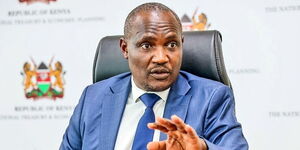In an intriguing turn of events, activist Morara Kebaso met with former Deputy President Rigathi Gachagua on Saturday, just days after Gachagua expressed interest in appointing a Gen Z deputy.
According to Kebaso, the meeting, held in Nairobi, was to discuss pressing national issues and focused on political reforms, youth unemployment, and human rights concerns.
Kebaso, who has jumped into prominence for exposing ghost projects, emphasised the importance of engaging with diverse leaders to amplify the youth's voice in the quest for change.
In a statement released on social media, he stated that the discussions also addressed economic exclusion and strategies to ensure justice for victims of brutality, abduction, and extrajudicial killings.
He said, “I will continue to engage leaders from across the political, religious, and civic spaces in amplifying the voice of the youth in their quest for change.”
This engagement comes on the heels of Kebaso's participation alongside Gachagua during the launch of the People's Liberation Party (PLP) in Nairobi.
The event, which took place on Thursday, also saw the involvement of prominent figures like Martha Karua and Kalonzo Musyoka.
Gachagua has been vocal about integrating younger leaders into the political arena. In a recent media roundtable, he expressed his intention to have a Gen Z deputy in his party, stressing that young people are not just future leaders but leaders of today.
He believes that combining his experience with the creativity of Gen Z will offer a balanced approach to leadership.
“My party will involve them (Gen Z) to a very large extent at the position of deputy party leader. I'm the party leader; my deputy will be a Gen Z so that we involve them,” Gachagua told the media.
Kebaso's actions mark a notable shift from his earlier stance. Three months ago, he publicly declared his independence from mainstream political parties, insisting on his commitment to charting a unique path with the Inject Party.
However, recent collaborations suggest a strategic realignment. Kebaso's involvement in the PLP launch and his meeting with Gachagua indicate a willingness to engage with established politicians to further his agenda.
This evolution reflects what has been termed as a pragmatic approach to achieving what may be meaningful reforms by building alliances across the political spectrum.
Political analysts observe that Kebaso's engagements could signal a broader trend of youth leaders integrating into mainstream politics to effect change from within.












